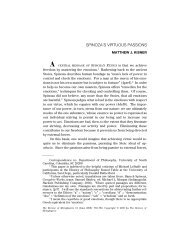heidegger's being and time and national socialism - Philosophy ...
heidegger's being and time and national socialism - Philosophy ...
heidegger's being and time and national socialism - Philosophy ...
Create successful ePaper yourself
Turn your PDF publications into a flip-book with our unique Google optimized e-Paper software.
had advanced most. He also assumed that Plato<br />
<strong>and</strong> Aristotle understood philosophy the way he<br />
himself understood it, namely, as a transcendentalist<br />
phenomenology of everydayness. However,<br />
after Aristotle a decline set in. Thus “we”<br />
must repeat the Greeks <strong>and</strong>, as he says in the famous<br />
lecture course on Plato’s Sophist in winter<br />
1924–25, liberate them “from the tradition . . .<br />
that . . . distorts” them. 154 Hence Heidegger<br />
praises Kant not, as Caputo would have it, because<br />
Kant liberated us from ancient ideas but<br />
precisely because he, as Heidegger said in a lecture<br />
course in summer 1926, “became the first<br />
Greek again, though only for a short <strong>time</strong>,” 155 for<br />
he returned to transcendental philosophy though<br />
not yet to an analysis of everydayness. Heidegger’s<br />
lecture courses on the history of philosophy<br />
up to the early 1930s are, implicitly or explicitly,<br />
centered on Plato <strong>and</strong> Aristotle, whose status for<br />
Heidegger is summarized by the following nine<br />
aspects. 156 (1) Plato <strong>and</strong> Aristotle, as Heidegger<br />
himself does, investigate existentials, phenomena,<br />
<strong>and</strong> in particular they start with everyday<br />
phenomena. (2) Plato <strong>and</strong> Aristotle, as Heidegger<br />
himself tries to, investigate the phenomena without<br />
<strong>being</strong> caught up in the split between subject<br />
<strong>and</strong> object which is, according to Heidegger,<br />
characteristic of modern philosophy. (3) Plato<br />
<strong>and</strong> Aristotle, as Heidegger himself does, ground<br />
different phenomena in, or try to reach for, a superstructure—in<br />
Being <strong>and</strong> Time called care<br />
(Sorge)—that is not caught up in the subject-object<br />
split. (4) Plato <strong>and</strong> Aristotle, as Heidegger<br />
himself does, approach the phenomena by breaking<br />
through the prejudgments of other philosophers.<br />
(5) Because of features 1–4, Plato <strong>and</strong><br />
Aristotle are the most advanced Greek philosophers,<br />
<strong>and</strong> they are on the right track concerning<br />
the proper interpretation of the phenomena. (6)<br />
Despite features 1–5, however, Plato <strong>and</strong> Aristotle<br />
don’t manage to fully break through, for<br />
they share with the other Greeks some self-evident<br />
orientations—notably, an interpretation of<br />
speech as something present at h<strong>and</strong> <strong>and</strong> the conception<br />
of the <strong>being</strong> of <strong>being</strong>s as presence—that<br />
obscure the proper approach to the phenomena.<br />
(7) Heidegger locates the flaw in Plato or Aristotle.<br />
(8) Because of features 6 <strong>and</strong> 7, Heidegger<br />
PHILOSOPHY TODAY<br />
270<br />
has to go beyond Plato <strong>and</strong> Aristotle <strong>and</strong> develop<br />
the proper account of the phenomenon. (9) Since<br />
philosophy after Plato <strong>and</strong> Aristotle is a<br />
downward plunge, we have to repeat the Greeks,<br />
<strong>and</strong> this repetition is relevant not only to<br />
philosophy but to the entire current world.<br />
As one sees, in a way this looks like the drama<br />
of historicality for here, too, we have to repeat<br />
something. However, the difference is that destiny<br />
<strong>and</strong> its call are absent. No one calls upon the<br />
Greeks to discover the truth <strong>and</strong> no one calls upon<br />
Heidegger to repeat the Greeks. The truth does<br />
not reveal itself, <strong>and</strong> it does not conceal itself either;<br />
it is simply indifferent toward Dasein’s efforts<br />
to uncover it. Further advanced on this path<br />
one could imagine that, in hindsight, the need of a<br />
return to the Greeks would just be a minor bump<br />
on the road to the full clarity of the sempiternal<br />
existentials <strong>and</strong> that also the drama of<br />
historicality would somehow have lost its significance.<br />
Yet, Heidegger turned in the opposite direction.<br />
On this path, neither Plato <strong>and</strong> Aristotle<br />
nor Heidegger himself remained the phenomenological<br />
fundamental ontologists that they had<br />
been, <strong>and</strong> their ways parted dramatically.<br />
One can well recognize this development with<br />
regard to Heidegger’s three lecture courses on<br />
Plato’s Theatetus <strong>and</strong> the simile of the cave in the<br />
Republic. In the course in summer 1926, the<br />
drama of historicality is completely absent. 157 In<br />
the lecture course in winter 1931–32, Heidegger<br />
interprets—<strong>and</strong> this part is probably Heidegger’s<br />
best course on Plato or Aristotle ever—the<br />
Theatetus in terms of existentials. However, this<br />
reading already st<strong>and</strong>s in the shadow of a presentation<br />
of the simile of the cave as the drama of<br />
historicality. 158 Also in the lecture course in winter<br />
1933–34—one year after Hitler’s “seizure of<br />
power”—Heidegger makes clear from the beginning<br />
on that we have to repeat the Greeks. History<br />
after the Greeks is a downward plunge resulting<br />
in Enlightenment <strong>and</strong> liberalism in which<br />
all the powers against which National Socialism<br />
fights have their roots. Heidegger still talks about<br />
existentials, but they have become marginal. The<br />
simile of the cave shows that, with Plato, truth as<br />
correct statement established itself as the dominant<br />
truth. Authentic truth had been articulated in
















